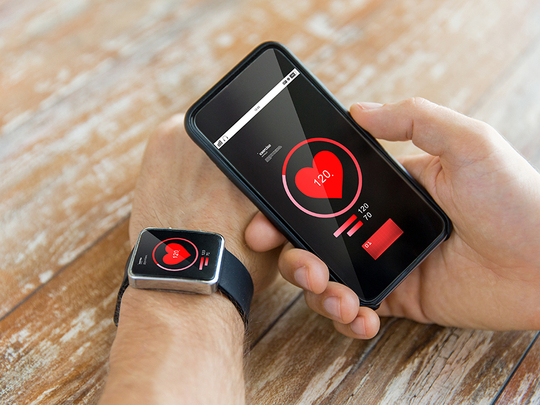
While cardiovascular disease can be a hereditary issue, in the majority of cases, it is a result of unhealthy lifestyle choices. Dr Fahad Baslaib, Consultant and Head of Cardiology Department at Rashid Hospital, Dubai Health Authority (DHA), refers to these choices as reversible causes. These include smoking, a lack of exercise, obesity and an unhealthy diet. “This can cause elevated blood pressure, diabetes and high cholesterol, which are risk factors for cardiovascular disease,” he says.
Even if you do have a family history of hereditary cardiovascular disease, while you won’t be able to alter your genetics, DHA recommends making healthy lifestyle choices to significantly reduce the risk of heart disease.
Regular screening
Due to the high prevalence of diabetes and heart disease in the UAE, Dr Baslaib recommends that people be screened for their cardiovascular health at an earlier age than is advised in some western countries. “In the West, we would recommend having your blood pressure tested after the age of 40 but in our region, I would recommend that after the age of 30, people should start checking their cholesterol, blood sugar and blood pressure,” he says.
Dr Baslaib refers to how hypertension is one of the leading causes of heart disease. He calls it the silent killer. “Sometimes there are no symptoms but the common symptoms of hypertension are headaches, neck pain, blurred vision and chest discomfort,” he says. “If you develop cardiovascular disease, with a blockage in the arteries, then you have to watch for chest pain. A classic case is when someone has heaviness on their chest, which radiates to the arm or jaws. Difficulty breathing is also a symptom that you have to watch for.”
When people are screened at DHA, their blood pressure, heart rate, weight, height, cholesterol and BMI are assessed. People are also assessed using an ECG (electrocardiography). If issues are detected, patients may be assessed on a treadmill stress test.
“On the treadmill, we monitor their ECG as the regular ECG is done while a person is at rest,” explains Dr Baslaib. “When you place them on the treadmill, we can monitor their ECG during exercise and during the recovery phase. “We also monitor if there is any electricity abnormality during the test as well as the patient’s blood pressure and heart rate in response to exercise.”
Another way of assessing someone’s cardiovascular health is through echocardiography, which is essentially an ultrasound of the heart that assesses the functionality of the heart muscles and evaluates the functionality of the heart valves.
Treatment and control
If people have abnormal ECG or echocardiography results, it may indicate a blockage of the arteries. In these cases, doctors may carry out a coronary angiography, which is a special X-ray test that checks if there are any blockages. “Depending on the blockage, and the significance of the blockage, it can be treated medically, either by implanting stems or by surgery.
“There are different medications that we use such as aspirin, cholesterol medication and blood pressure medications; it depends on the case of the patient,” says Dr Baslaib.
Once an artery blockage has been treated, DHA works to ensure that the patient makes the suitable lifestyle changes that will allow them to maintain their cardiovascular health. “Once a patient is diagnosed, their doctor will advise patients about what sort of exercise they should do,” says Dr Baslaib. “If, for example, someone had a blockage in the artery and we fixed it by implanting a stem, we recommend that this patient exercise regularly.”
Raising awareness
DHA is committed to raising awareness of cardiovascular disease, working with the philosophy that prevention is preferable to cure. The authority regularly holds campaigns in public spaces such as malls as well as hosting screenings in locations such as labour camps and different government authorities. The campaigns including free screenings for members of the public where they are tested for blood pressure and BMI as well as diabetes.
Cardiologists are then available to advise and educate people based on their results. Each year DHA also marks World Heart Day, which takes place on September 29. “At DHA, for the past six or seven years, we decided to carry out a series of campaigns across on month to mark World Heart Day,” says Dr Baslaib. “We focus on prevention more than anything else.”
Ultimately, though, the biggest weapon in the fight against cardiovascular disease is encouraging people to make healthy lifestyle choices. “The average age of heart attacks worldwide is in the mid-sixties, but in our region, we see it 10 to 15 years earlier than in the western population,” explains Dr Baslaib. “This is due to smoking, diet and higher incidences of diabetes.”










